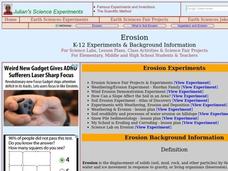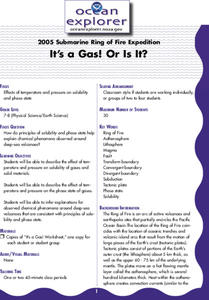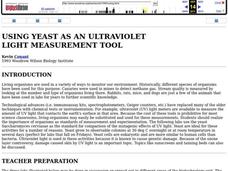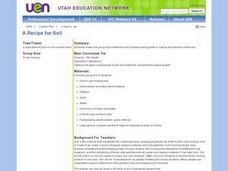Curated OER
The Science of Glaciers
Students identify the contents of a glacier like those found in Patagonia. They construct a mini glacier model in class. Students compare and contrast the classroom model with Patagonian glaciers. They label specific parts of the...
Curated OER
LOSING GROUND
Students will observe wind erosion and how crop residue prevents erosion.Point out the three kinds of fields to the students. Do as much or as little instruction as needed to explain the pan with crop residue. Conservation tillage...
Curated OER
The Littlest Matryoshka
Students listen to the story The Littlest Matryoshka and sequence the story. In this sequencing lesson plan, students sequence the story and also make little dolls based on the story and write stories about them.
Curated OER
Erosion
Students examine soil erosion and what causes it. In this soil lesson students complete several experiments on soil erosion and the weathering process.
Curated OER
Puerto Rican Parrot Paradise
Young scholars investigate the environment of the Puerto Rican Parrot. They visualize the ecosystem with and without information. They conduct research to find information and participate in classroom discussion to demonstrate...
Curated OER
Keep It Cool
Students complete a science experiment to study insulation, heat transfer, and permafrost. In this permafrost study lesson, students design and test a soda insulator. Students graph their class data and discuss the results. Students...
Curated OER
Stratigraphy and Cross-Dating
Students interpret archaeological strata using the law of superposition. They apply cross-dating to determine the age of other artifacts.
Curated OER
Aerology- The Study of Mars
Students investigate various aspects of the planet Mars. They examine a core sample that is simulated to make observations. Then compare the known sample with one that is unknown and differentiate between the two. Students hypothesize...
Curated OER
Creating and Analyzing Graphs of Tropospheric Ozone
Students create and analyze graphs using archived atmospheric data to compare the ozone levels of selected regions around the world.
Curated OER
A DISAPPEARING ACT Astronomy: Do Stars Always Shine?
Learners observe why stars are not visible during the day with a classroom demonstration using an index card punched with holes.
Curated OER
Cookie Bar Coal
Students observe the effect of heat and pressure on materials representing those involved in the formation of coal.
Curated OER
CO Buildup City
High schoolers conduct a controlled experiment. They collect data in an organized manner. Students analyze data to reach a conclusion and communicate findings. They explain how city size, temperature, and pollution is related to the air...
Curated OER
Investigating Erosion in an Outdoor Classroom
First graders observe the effects of erosion. They work in groups to simulate erosion in a streambed, participate in class discussion, read books about fossils and rocks and then go on a fossil hunt.
Curated OER
What's The Level?
High schoolers examine the movement of the water table and saturation zones. They describe the movements of the water table and locate the saturation zones. Students identify the function of each saturation zone. They develop a model of...
Curated OER
Science: What Happens to Create the Lode?
Young scholars understand how mineral deposits are formed and why they are not evenly dispersed. They create and describe three different precipitates from four solutions simulating mineral ore deposit formation in sedimentary rock.
Curated OER
It's a Gas! Or is it?
Students discover the principles of solubility and phase state and their influence on chemical phenomena observed around deep-sea volcanoes. They describe the effect of temperature and pressure on solubility of gasses and solid materials.
Curated OER
It Looks Like Champagne
High schoolers determine some practical implications of the discovery of liquid carbon dioxide in deep-ocean ecosystems. They interpret phase diagrams and explain the meaning of "critical point" and "triple point."
Curated OER
Avalanche
Young scholars investigate the concept of avalanches and how they effect people who use the slopes. They conduct research using multiple resources that includes the internet in order to create a final oral presentation.
Curated OER
Life in a Cup
Third graders make and maintain a mini terrarium. They keep a daily journal of what happens in their terrarium and record daily observations and measurements.
Curated OER
The Magic School Bus Out of this World
Pupils explore the craters that objects of different sizes and weights make. They use marbles, Ping-Pong balls, and aluminum-foil balls for this experiment. They investigate what would happen if they drop objects that aren't round.
Curated OER
Using Yeast as an Ultraviolet Light Measurement Tool
Students accurately measure the relationship between radiation dose and either survival or some genetic event such as mutation or recombination. They investigate the damage that was done to the DNA molecule as a result of exposure to...
Curated OER
Metamorphic Sandwiches - - "Bread Rock"
Students graphically show how metamorphic rock is formed by pressure and heat using bread.
Curated OER
A Recipe for Soil
Fourth graders use local materials such as leaves and other plant matter; sand and pebbles to make soil. They plant seeds in the manufactured soil and in natural soil and then observe and record the results.
Curated OER
The Effects of Ultraviolet Light on Lumbriculus
Students explore the effects of ultraviolet light on Lumbriculus. They expose ultraviolet light to Lumbriculus (worm) and determine the lethal exposure time. They examine the worm and record their observations.























